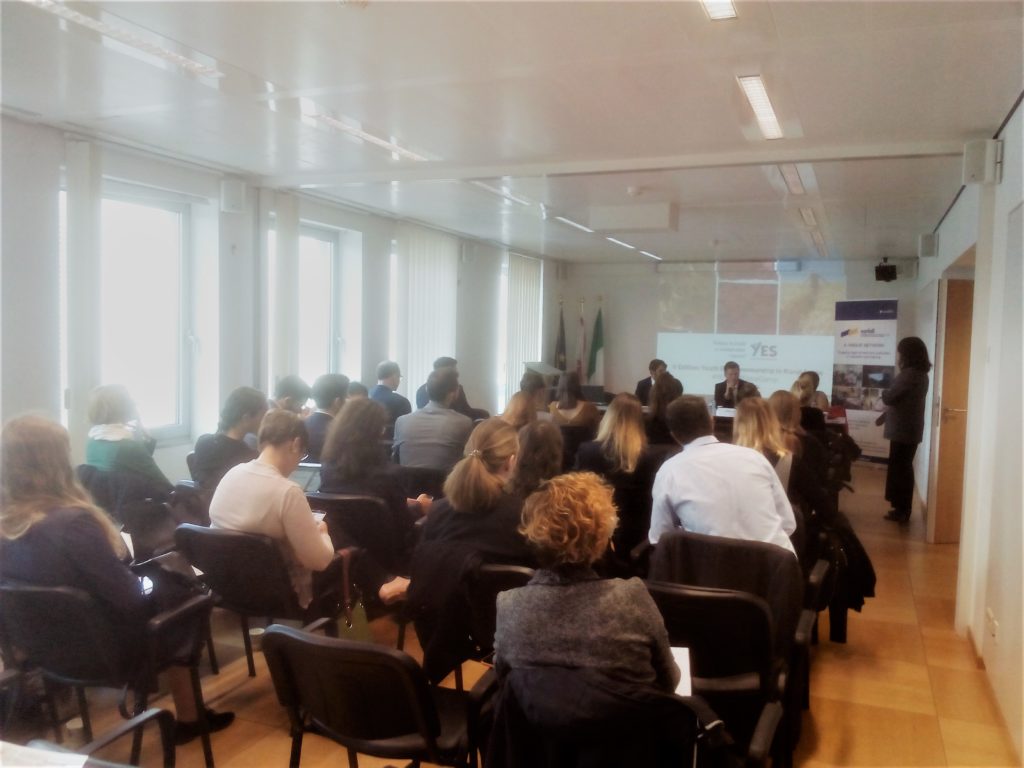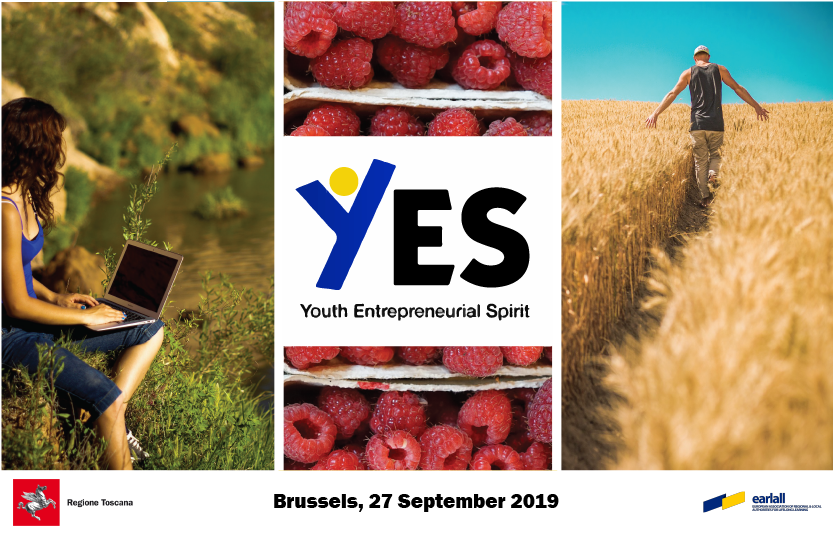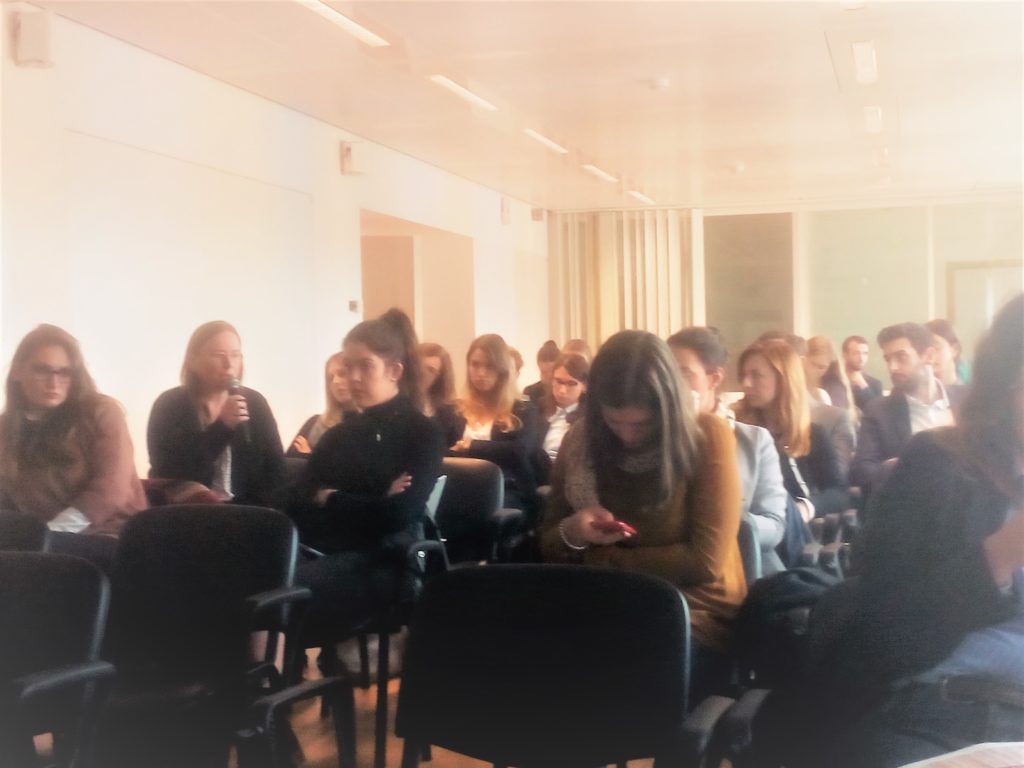“Not everyone is interested in talking to the youth…” We are! / Second Edition of YES Conference, Fostering Youth Entrepreneurial Spirit!
30/09/2019
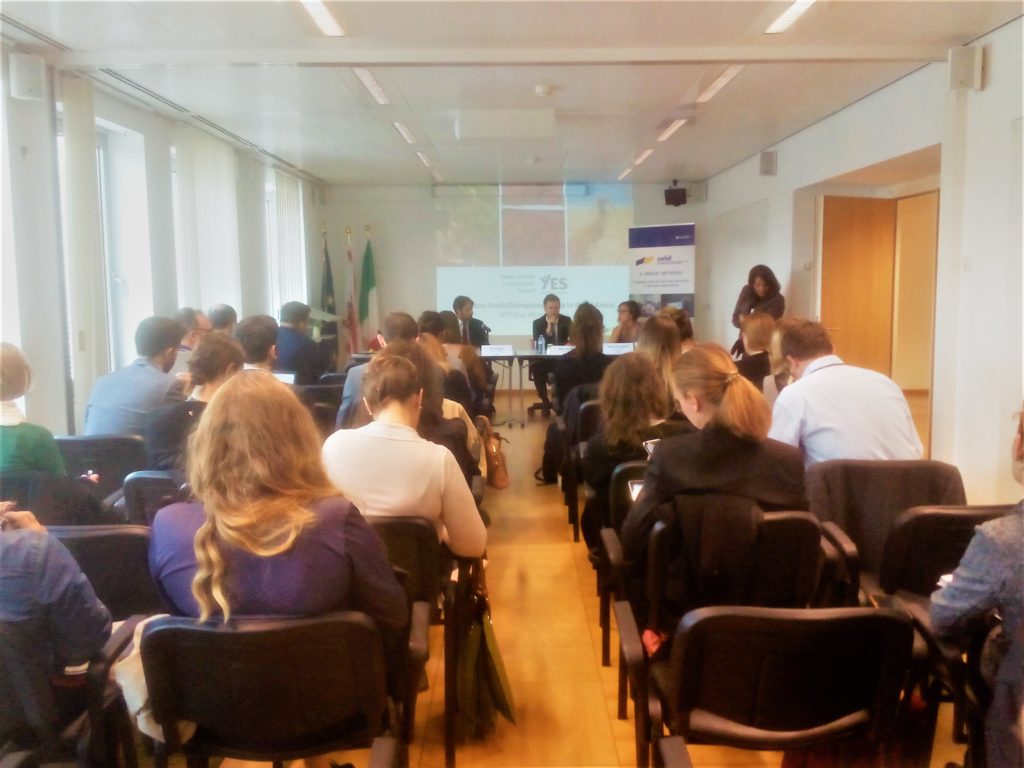
A diverse audience gathered at Tuscany Region EU Liaison Office on 27 September for the second edition of the YES Conference (Youth Entrepreneurial Spirit), organised by Tuscany Region and EARLALL. Regional policy officers; EU representatives (European Commission, European Committee of the Regions); members of NGOs and international associations; the business sector; and, most important, young people discussed about how to boost young entrepreneurship in rural areas. The debate was fed with interventions from different stakeholder groups, who agreed on the importance of having education opportunities available to foster an entrepreneurial spirit among the younger generations.
The conference was introduced by Mariachiara Esposito, Policy Advisor at Tuscany Region Liaison Office to the EU, and Robin Saluoks, CEO of eAgronom. A young but experienced entrepeneur, Robin left professional football at age of 17 to start a company which got the European best student company title. However, he left the CEO position to study computer science and, after one year of university, he started to work full-time in his father’s farm. Frustrated with the state of software in farming, he started developing a tool that could help him manage farm activities and financials — shortly after, eAgronom was born. Robin highlighted that the most important things in entreprenurship are a) knowing how to create a company; b) openly approaching clients, since would-be buyers can teach you how to improve your product; and c) cooperating with university to improve your know-how .
Afterwards, Bruno Cortese, Desk Officer at the European Commission (DG EMPL), introduced the SELFIemployment fund as part of the European Social Fund (ESF). This country-specific initiative, managed by Italy’s National Agency for Active Labour Market Policies (ANPAL), finances investment plans between € 5,000 and € 50,000 by means of microcredits, extended microcredits and small loans. The aim of SELFIEmployment is to provide young NEETs (not in employment, education or training) with the opportunity to establish their own enterprises or undertake a self-entrepreneurship path.
SGDs and digitalisation, a window of opportunity?
Two panels followed, providing a space for exchange and discussion. The first one dealt with XXIst century challenges as a window of opportunity for young entrepreneurial spirit in rural areas. A video presentation by Daniele Zini, Desk Officer at the Autonomous Province of Trento, introduced the YEP (Youth Entrepreneur Path) initiative, a free service to foster youth entrepreneurship in Trento. The path comprises several steps, including local engagement; interviews and evaluation of potential entrepreneurs; skills assessment and entrepreneurial coaching; accompanying of youngsters in the definition of their entrepreneurial idea; and managing Individual Learning Accounts (ILAs, credits that can be used for education & training activities related to the business idea).
Hanna Alajõe, Projects Director at AEGEE / European Students’ Forum, highlighted the role that volunteering can have in fostering entrepreurial spirit among young people. She introduced the Europe on Track project, run by young volunteers who travel around Europe to raise awareness and create a space for discussion on important social issues, with young people at the centre. However, one of the main challenges they find is that “not everyone is interested in talking to the youth.” Conversely, outreach was one of the key issues stressed by Eva Reina, Director at ERYICA / European Youth Information and Counselling Agency, in relation to the information behaviour and needs of young people. She presented the Future Youth Information and Counselling survey results, concluding that young people find it difficult to access information on entrepreneurship, housing, and employment. Indeed, a striking contradiction was found, since “young people perceive that they have high information searching and evaluation skills but they have troubles to validate online information.”
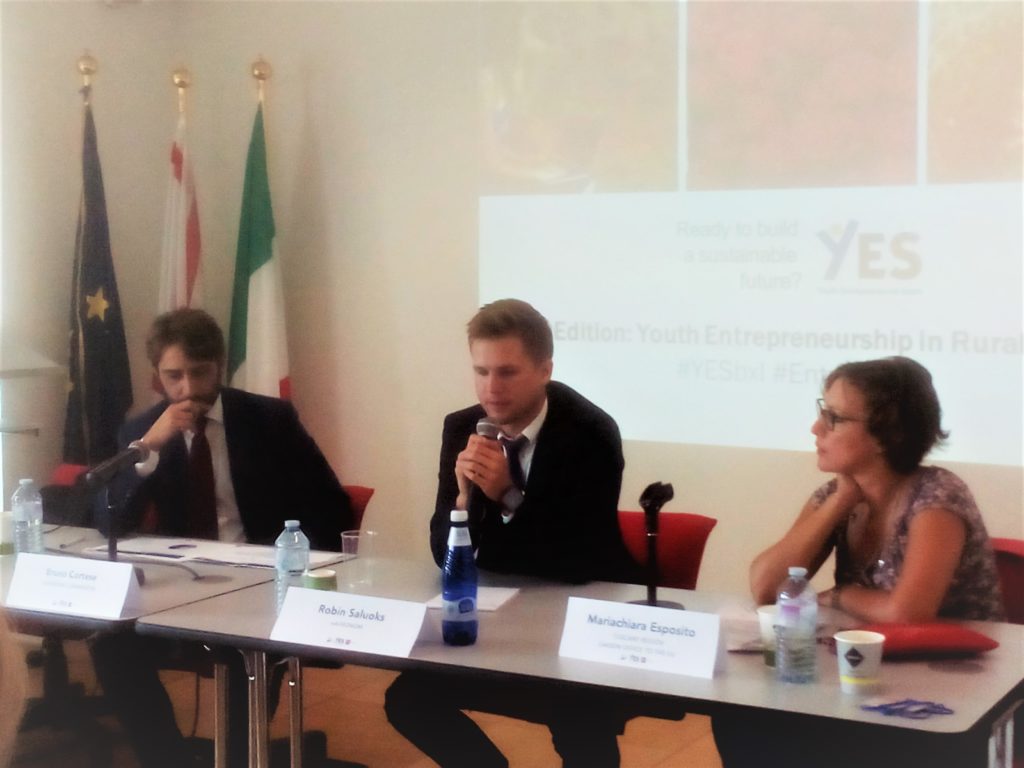
Bruno Cortese, Robin Saluoks and Mariachiara Esposito 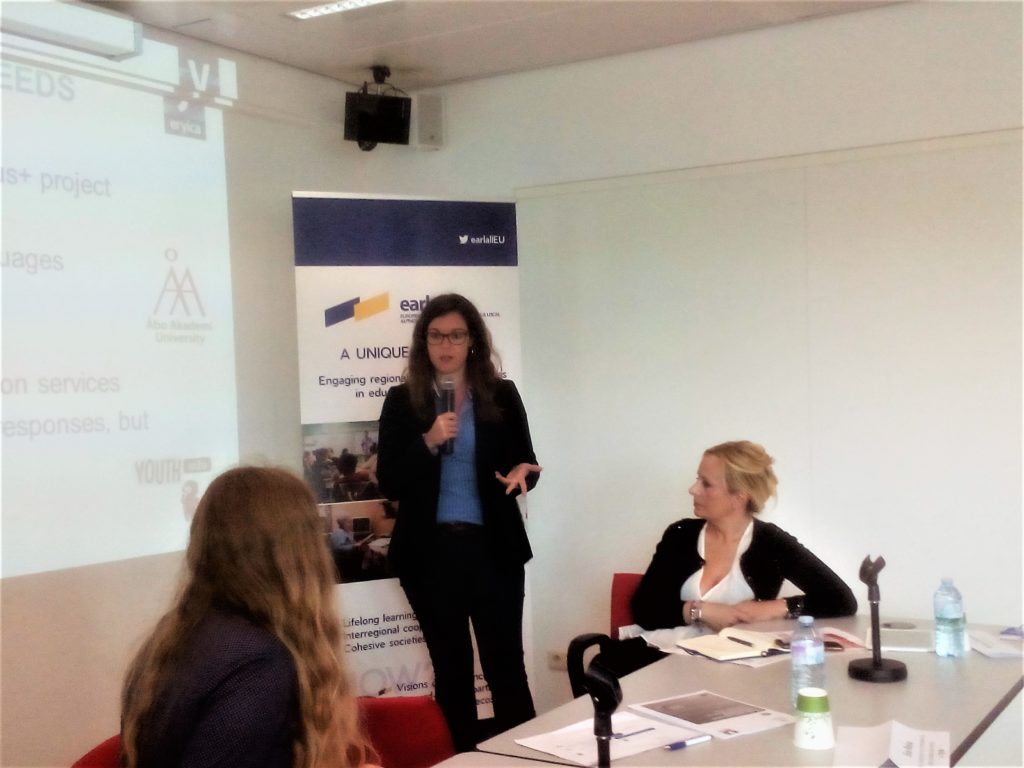
Panel I: Hanna Alajõe, Eva Reina and Miriana Bucalossi 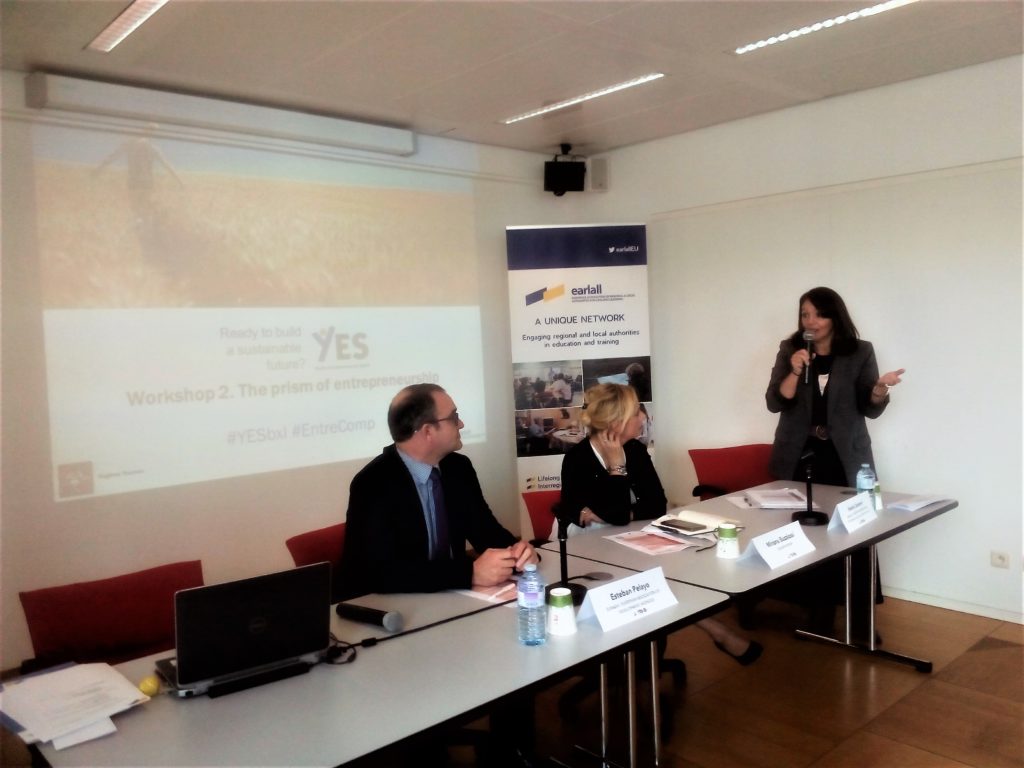
Panel II: Esteban Pelayo, Miriana Bucalossi and Noelia Cantero
The prism of entrepreneurship
The second panel tackled the various ways of understanding entrepreneurship and provided regional examples of entrepreneurial innovation. Miriana Bucalossi, Head of VET Policies and European Project Management at Tuscany Region, introduced the region’s initiative to foster the creation of community cooperatives (link in Italian), to be funded with € 1,200,000. Vittorio Bugli, Tuscan Regional Minister, saluted conference participants via video, and funded project examples were presented, such as a community hotel and cultural centre in Petroio, and sustainable tourism initiatives in Vivo d’Orcia. A remarkable highlight was that it was mainly young people who applied for funding, showing the willingness in the area to reboost their towns and bring them back to life.
Lastly, Esteban Pelayo, Director at EURADA / European Association of Development Agencies, introduced innovative projects for rural development in Croatia, Finland and the UK (Scotland). The PISMO business incubator for the gaming industry is under development in Novska (13,500 inhabitants). By arranging and equipping business infrastructure and creating a favourable entrepreneurial climate, the objective is to encourage start-ups, strengthen the existing entrepreneurs and support institutions for entrepreneurs. On another note, the Kaajani University of Applied Sciences is developing a project to study the job based skills required in current times and prepare course modules accordingly: Digital & Work-based Learning (DWBL) to Boost Employment Opportunities, funded by the ESF. And last but not least, the South of Scotland Enterprise Agency has been created to support an inclusive regional economic growth.
Follow up
Other regions were eager to introduced their initiatives during the Q&A sessions, such as the Austrian Federal State of Salzburg, presenting Creators Camp for Global Ideas and Mitmischen und Aufmischen im Dorf. The YES initiative will continue growing within EARLALL’s Working Group on Youth Policies during next year. Participants welcomed the idea of a third edition of the YES Conference for 2020, and a joint project is under development phase within EARLALL regions to train their staff and introduce new ideas of promoting youth entrepreneurship.


